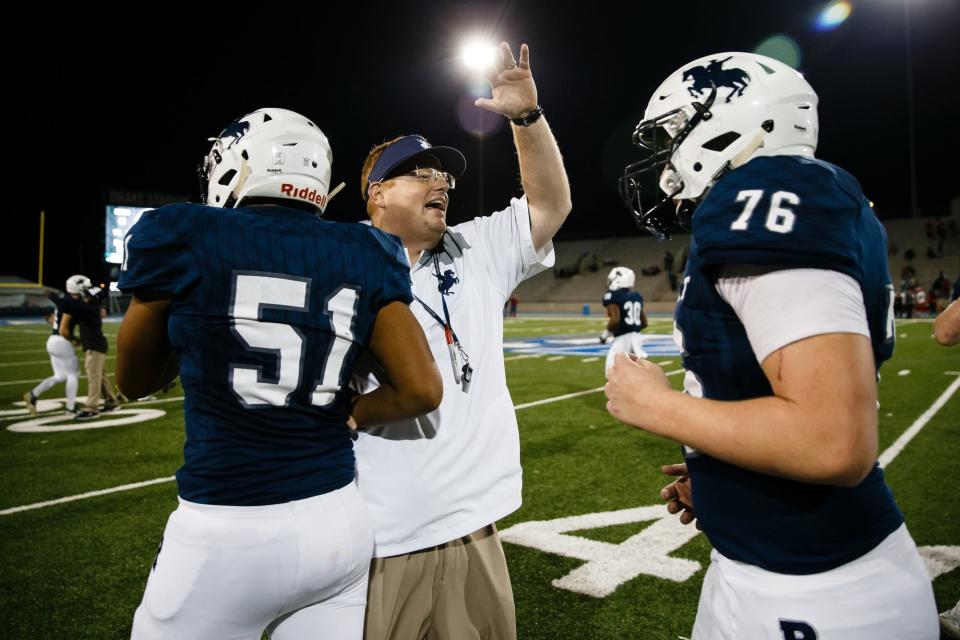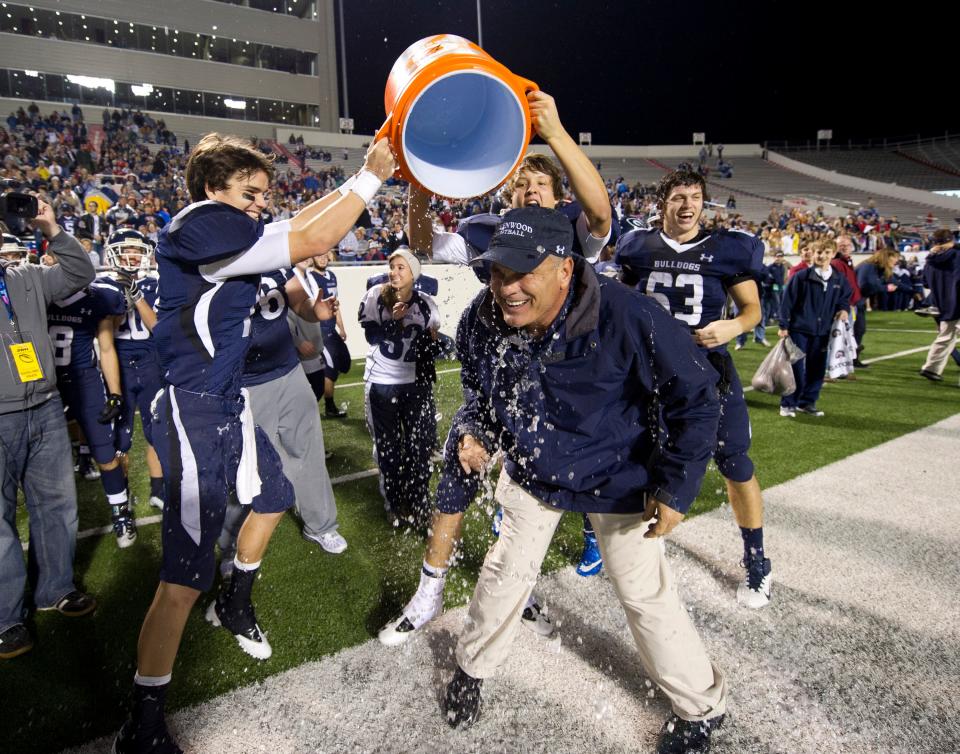On the come-up: How Mizzou coaches first made an impact in high school football ranks
Every coaching career starts somewhere.
For some, they begin at the college level, perhaps as a graduate assistant, doing grunt work for little money before moving up in the ranks.
Others grind it out at the lower levels. A good portion of Missouri’s staff spent time coaching high school football, figuring out Friday nights before moving to Saturdays.
Here are the stories of how some of the Tigers’ coaches made an impact on high school student-athletes before moving on to coach college football.
Eli Drinkwitz
Springdale High School’s football players got off to an early lead in the Thanksgiving turkey trot 5K race. The young athletes took a fast start and assumed they would cruise to victory.
Eventually, they got tired. Then, their offensive coordinator, Eli Drinkwitz, rolled past them, having paced himself enough to beat his players in the late going.
“We thought we were going to be able to sprint,” former quarterback Joseph Calcagni said of the players' mindset. “We ended up dying and he passed us. He’d let us know about that too, that he’d beat us in a 5K.”
Missouri’s current head coach spent his early years in coaching at the high school and middle school levels in Arkansas. After spending time at his alma mater, Alma, coaching seventh graders, he took over as Springdale’s offensive coordinator in 2006.
Drinkwitz wasn’t much older than his athletes at that time, and gained a reputation as a players’ coach. He’d go fishing with them, get doughnuts for the group and crack jokes during practice.
Calcagni described him as an excellent motivator too, using clips from movies like Band of Brothers and Tombstone to inspire the Bulldogs.
“He was just really good at picking you up,” Calcagni said. “I made a lot of mistakes as a quarterback and I just remember him, he’d come, put his arm around me, ‘Hey, we’re going to be all right.’”
Calcagni, who went on to play college football at Tulsa, said he saw the signs then that would lead to Drinkwitz’s later success, from his connection to players to his attention to detail. He later saw those traits in action at a higher level, working under his former coach as a graduate assistant at North Carolina State and Appalachian State.
Now, he’s the running backs coach at Fayetteville High School. Wisdom he learned from Drinkwitz has stuck with him.
“Football will humble you, so will life,” Calcagni said of the biggest lesson his old coach taught him. “If you, just in your job, whatever you want to pursue in life, if you’re slipping up and you’re not bringing your best effort each and every day, good things won’t happen. But if you treat every day like, ‘Hey, I’m going to go and I’m going to get better, I’m going to do my best,’ good things will happen.”
Al Pogue
Carver High School in Montgomery, Alabama, was in the midst of major construction projects. In 2008, its football team didn't have access to its practice field.
Head coach Al Pogue, who now leads Missouri’s cornerbacks, found a public park near the school and the Wolverines began using it for practice. There was just one problem, one that Billy Gresham, one of Pogue’s assistants at the time, said demonstrated one of the head coach’s best traits.
“These people walk their dogs and of course, dog crap would be all over the field,” Gresham said. “As we’d get practice schedules together, (Pogue) would go ahead and leave the school to go to the park and he’d be out there just walking the field picking up dog crap. Eventually, over time, everybody stopped watching and joined. He never asked us to do it.”
Pogue was known for leading his team by example. When he came to Carver before the 2008 season, the Wolverines were in rough shape and had won only three games the previous year.
In his first campaign at the helm, Carver went undefeated in the regular season and made a run to the state semifinals.
According to Gresham, Pogue made immediate culture changes when he took over the Wolverines, and they paid off quickly.
The coach “loved up” on his players, but expected a lot from them, even once suspending his starting quarterback for missing class.
“For those kids, outside of football, their environment was tough,” Gresham said. “Football was kind of all they had and so he always wanted to keep it a positive environment and the kids kind of respected that, so when you did have those moments when things needed to be corrected immediately, those guys respected it and were able to respond really well.”
After coaching at Carver capped off his 12-year run as a high school football coach in Alabama, Pogue took a job as an offensive quality control coach at Auburn. Gresham took over the Wolverines before moving up into the college ranks himself.
Gresham, now an assistant at Alabama State, said Pogue’s ability to build genuine relationships with players was his biggest lesson.
“When those guys really know and feel that you care and it’s bigger than just football, those guys are going to bust their tail for you,” Gresham said. “They’re going to give you their all. They’re going to trust what you tell them, on and off the field, when it comes to advice, all those things. As a young coach, I got those things from him.”
Erik Link

Before Missouri tight ends coach and special teams coordinator Erik Link arrived in Des Moines, Iowa, Roosevelt High School was drop-dead terrible at football.
The 2015 Roughriders hadn’t managed to win a game, and were 7-29 in the past four seasons.
Link, who went to North High School in Des Moines, returned to his hometown in 2016 after a stint as an analyst at Auburn. Roosevelt running back Desmond Alexander, who played at Simpson College, said Link got the town excited.
“When I first came in as a freshman, it didn’t really feel like Roosevelt was a football school,” Alexander said. “It felt like it was more of a band, or choir, opera school. He helped change that around and got the community involved a lot. He organized events for us to put our name out there. We got involved with the community and just picked up our spirits.”
Success wasn’t instantaneous for Roosevelt. In Link’s first season, the team won just three games. Still, that was more than they’d won previously.
After the first victory, a 24-10 triumph over the Ottumwa Bulldogs, Alexander said the team dumped Gatorade on Link.
“He’s a bigger guy, but he had a windbreaker on and I’ve never seen a windbreaker so big,” Alexander said. “So he kind of looked like the Kool-Aid Man. No disrespect, coach, but I remember seeing it, it just made it all so much better.”
By his second and final season, the Roughriders were much improved. They went 5-4.
It was the school’s first winning record since 2006. Link had succeeded in simply making Roosevelt better at football.
But according to Alexander, what really made him stand out was his connection to his players.
“He was never scared to talk to anyone and he always had time, too,” Alexander said. “Whatever you needed, he was able to tend to you, and that’s something I always appreciated about him.”
Rick Jones

The Greenwood Bulldogs were about to lose the 2010 Arkansas 5A state championship game.
With just over three minutes remaining, Rick Jones’ squad trailed 35-21 against Camden Fairview.
On the sideline, the man who built the Bulldogs’ culture from the ground up wasn’t fazed. Chance Moquett, who played four years for Jones at Greenwood, was within earshot when his coach made a declaration.
“They don’t get the ball back, boys,” Jones said, according to Moquett.
Jones was right. Greenwood scored a touchdown, got the onside kick, then scored again.
After a 2-point conversion, the Bulldogs pooch-kicked the ball high, then recovered a Fairview fumble. Greenwood won 36-35.
“It was just utter certainty,” Moquett said. “You were never beaten with him. You were never beaten.”
Jones, now special assistant to the head coach at Missouri, build the Greenwood football program from the ground up. He took over in 2004 and created a culture inside the Bulldog team that has continued to present day, even in his absence.
Plenty of coaches talk about their desire to build good people instead of just good athletes. Jones put his words to action.
“Rick Jones is, outside of my father, the biggest influence to any level of success (in my life),” Moquett said.
It was all the little things. Jones never swore on the field, and players were held to exacting standards. Practices featured precisely measured periods, and when players did drills, things had to be perfect.
Off the field, Jones had even more standards for players. But when young athletes made mistakes, there was almost always a way back.
“Tell the truth,” Moquett said. “If you get caught doing something, then you tell the truth and you read a book and you write about it. You come to the conclusion that it was never about you and that it was a bonehead decision or whatever. It was, 'Did that make the team successful?' ... You were representative of the Greenwood Bulldogs and therefore you were representative of the city.”
Jones taught his players that they could only control their attitude and effort. The lessons stuck.
He’s still in touch with many of his old players. Moquett last texted him about a Georgia high school football running back (Jaylen Poe of North Paulding) who he felt was under-recruited.
When tough times hit, Jones has remained one of Moquett’s first calls.
“Everything I have to do in the ‘real world’ that has to do with culture, I take from his playbook,” said Moquett, who now works as head of sales for a tech company. “That man creates culture.”
Matt Stahl is the Missouri athletics beat reporter for the Columbia Daily Tribune. Follow him on Twitter @mattstahl97.
This article originally appeared on Columbia Daily Tribune: Missouri football coaches' high school experiences built them

